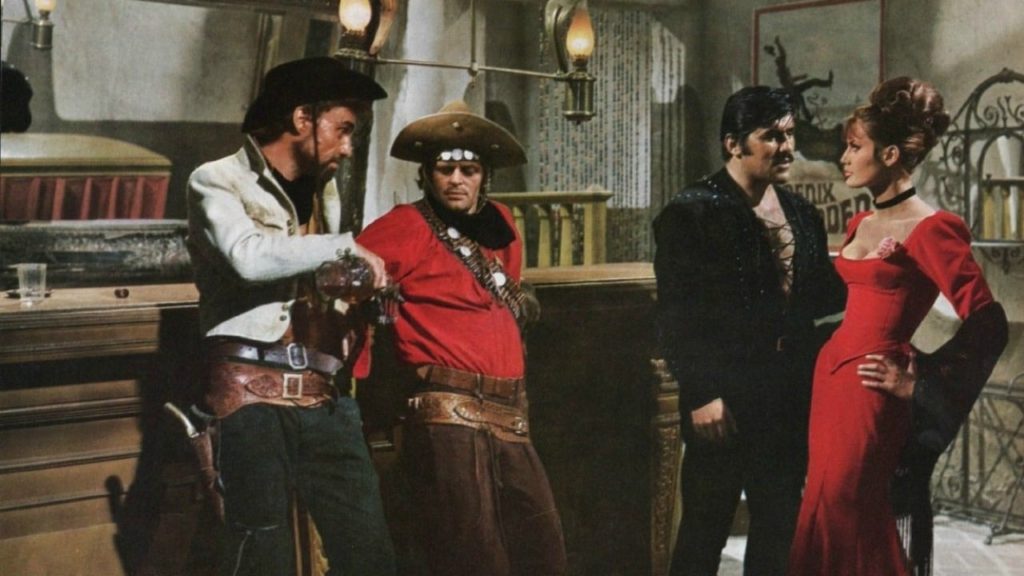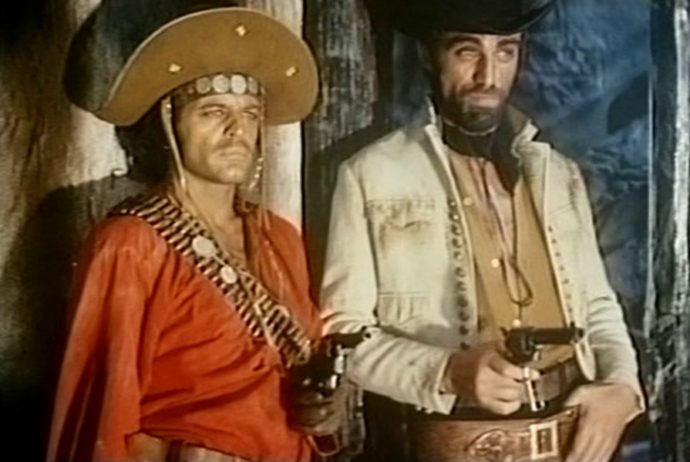Dir: Rolf Olsen
Star: Mario Adorf, Edmund Purdom, Walter Giller, Klaus Kinski
a.k.a. Der Letzte Ritt nach Santa Cruz
The Euro-western is one of the movie types most closely associated with Klaus, and this was his first entry in the field. Indeed, this manages to pre-date what’s commonly regarded as the “patient zero” of the spaghetti Western, Sergio Leone’s A Fisftul of Dollars, which came out later the same year. It seems a bit unfair this one has been almost forgotten, since there are a number of aspects which would become mainstays of the spaghetti sub-genre. Of course, this isn’t Italian: being German (technically, a West German-Austrian co-production); maybe we need to call it a sauerkraut Western? Though it’s far from the first Euro-western, or even the first German entry. With this being Klaus’s debut though, it seems a good point for a brief history of them.
As early as 1906, director Jean Hamman made Le Cowboy, later claiming in his autobiography that this was the first Western film. The first Italian entry was, of all things, a vampire Western, La Vampira Indiana, made in 1913. What’s particularly noteworthy is, it was directed by Sergio Leone’s father, Vincenzo Leone, and starred his mother, Bice Waleran, in the title role. The Germans weren’t far behind. Indeed, the country had been fond of the Western setting since before cinema, with the novels of Karl May being extremely popular at the end of the 19th century. In 1920, Bela Lugosi, of all people, played the Mohican chief Chingachgook, in two-part Western Lederstrumpf, based on the works of James Fenimore Cooper.
However, it took until 1962 for any of May’s Western novels to become a film, with Der Schatz im Silbersee the first to feature the Winnetou character. Kinski, of course, would appear in a subsequent franchise entry, Last of the Renegades, also later in 1964. However, most of these more or less followed the same kind of stories which were being made in the Hollywood westerns. Film-makers like Leone (For a Few Dollars More (1965)), Sergio Corbucci (The Great Silence (1968)) or Anthony Dawson (And God Said to Cain (1970)), all took the Western and twisted it in new, typically darker directions. While earlier than these, Olsen appears to be doing something similar, with this film spending more time with the supposed villain of the piece, and giving him attributes more befitting an anti-hero, something not often seen in Euro-westerns to that point.
This central character is Pedro Ortiz (Adorf), an outlaw who has just got out of prison after serving a two-year sentence. It’s not long before he and his colleagues Fernando and Jose (Kinski) breaking the law again, busting young gang member Carlos out of jail, killing seven men in the process. That done, they look to reclaim the proceeds from their last robbery, which was hidden near the Mexican border by Pedro before his capture. The gang head off, accompanied by Pedro’s girl Juanita, and saloon piano-player Woody (Giller), unfortunate enough to stumble into their activities. However, the outlaw also has revenge on his mind, against sheriff Rex Kelly (Purdom), the man who put Pedro behind bars. He’s no longer in law enforcement, but is a bank manager.

Determined to destroy Rex’s reputation as much as anything, Pedro kidnaps Rex’s wife and young son, holding them in order to force Rex to hand over the contents of his bank’s safe. They then high-tail it towards the border, keeping their hostages to ensure safe passage. Rex, however, is made of sterner stuff and tracks Pedro and the gang on their route, even after losing his horse in a shoot-out with Fernando. Pedro, meanwhile, is becoming more prone towards violence, in particular killing in cold blood the inhabitants of a hacienda where they take shelter. Carlos and Juanita begin to have second thoughts about their association, especially when Jose also falls to the relentless pursuit of Rex, and the others with reason to take Pedro down.
Despite all of the above, Pedro is not without redeeming features. According to the stories told by Woody, the outlaw is something of a Robin Hood figure to Mexican peasants: okay, he may not give to the poor, but he’s definitely robbing the rich, making him a folk hero for the common man. His word is his bond as well. Yet, in another bleak twist foreshadowing those of the Italian successors, this proves to be his eventual downfall. In contrast, once the movie has established Rex’s credentials as a family man, it seems to lose interest in any further development of his character. Kinski isn’t the only one here who would go on to “proper” spaghetti Westerns either. Rex’s wife is played by Marianne Koch, the female lead in A Fistful of Dollars, among others [she had previously appeared alongside Klaus in Ludwig II: Glanz und Ende eines Königs].
Klaus’s character is certainly unpleasant, though is the most competent of Pedro’s team. Jose sports an elegant headband below his Stetson, and sleazes his way in an appropriately creepy manner towards the captive Mrs. Miller, with predatory intent, though Pedro stops it going too far. His eventual fate is also memorable. After the hacienda massacre, Pedro sends Jose back to take care of Rex, unaware the former lawman is no longer acting alone. There’s a posse with him, and Jose rides right into them. Attempting to flee, he takes refuge in a church, and it looks like he may escape, with the priest being adamant that Jose gets sanctuary. However, when the priest goes in, Jose – presumably mistaking him as an attacker – guns him down. Sanctuary no longer applies, and a fire is set, smoking Jose out, where he’s killed by Rex after drawing on him.
It finishes, as you’d expect, with a confrontation between Jose and Rex, at the site where Jose hid his ill-gotten gains, though only after a twist which was quite effective. They end up having to rely on each other to get out of a tricky situation, though that’s where Jose’s keeping his word ends up a fatal weakness. I liked this one. It definitely feels ahead of its time, and has a grittier feel than the other sauerkraut Westerns I’ve seen, which works in its favor.

